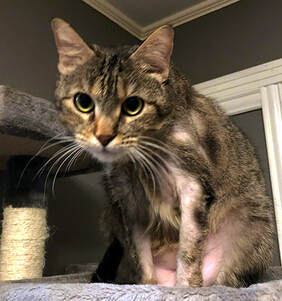
Hair loss in cats, otherwise known as alopecia, can be either partial or complete, according to animal dermatologists. And although it occurs for a variety of reasons, the most common one is skin allergies.
Cats may, in the course of their lives, get acquired alopecia, a symptom of a disease, not a disease itself, and veterinarians are the ones tasked with diagnosing its source. Happily, most affected cats’ hair does grow back, given time and the appropriate treatment.
Consider, then, the six most common conditions behind cat alopecia.
1. Allergies: Some cats are hypersensitive to the antigens in flea saliva, and if they’re bitten by a flea, they’ll become so desperately itchy that they’ll begin over grooming as a way of dealing with the itchiness. It isn’t as if their hair is simply falling out, these kitties are actually licking it so much that they’re not only pulling it out, they’re pulling it out far faster than it can be replaced.
Mange, scabies and lice can also make a cat’s skin itch, leading to that same vicious cycle of over grooming and hair loss. Other culprits include mites, food allergies and environmental allergies – all of which can cause that same unbearable itching, over grooming and hair loss.
Occasionally, cats will engage in compulsive over grooming because they’re suffering from neuropathic pain due to nerve damage in their skin. In rare cases, they may even over groom and lose hair for psychological rather than physical reasons, such as severe anxiety following a particularly stressful event.
2. Pain: Sometimes a cat will obsessively lick an area of her body not because it itches but because the tissue beneath her skin hurts. A cat suffering from arthritis, for example, may constantly lick at a specific, aching joint because it’s painful and licking helps relieve some of the discomfort. The downside of this: she’s also licking away her hair.
3. Infections: Less common than allergies, cats with various staph infections or fungal infections such as ringworm may lose a great deal of hair in those affected areas.
4. Endocrine disorders: If a cat’s losing hair, she may be suffering from hyperthyroidism (an overactive thyroid condition, it causes weight loss as well as many other symptoms). She may have a hormonal imbalance and an increased level of steroids in her body, causing hair follicles to die and preventing new hair from growing back. Cushing’s disease is one example of a metabolic disorder that produces too much cortisol (the body’s main stress hormone), potentially causing her alopecia.
5. Side effects from medication: Among the various medications prescribed for a number of conditions, transdermal prednisone, for example, which is often used to treat Addison’s disease, causes both hair loss and the curling of a cat’s outer ear. Once the medication is stopped, these unwanted side effects should also stop.
6. Cancer: Thankfully, cancer is rarely the reason for a cat losing hair. But neoplasia (these are abnormal growths caused by the uncontrolled division of cells) may cause it. Another serious condition is paraneoplastic alopecia, which is hair loss associated with moist skin and extreme itchiness.
Concerned about YOUR kitty’s hair loss? Simply bring her to the vet for a thorough examination.









 RSS Feed
RSS Feed